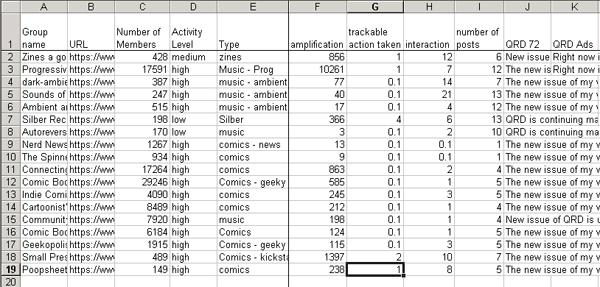 April 30, 2015
April 30, 2015 Signal, Noise, & Facebook Newsgroups
Over the past couple of years Facebook Groups have really risen to prominence as a way to get the word out about creative work. Unfortunately they have also proliferated to the point they are hard to keep track of & many have been so inundated by promotional posts that they are no longer useful. So I made this spreadsheet to help sort through things. 
Column A is the name of the group, Column B is the URL, Column C is the number of members of the group, Column D is the activity level, Column E tells you the type of group it is & I think that is probably where most people stop with their spreadsheet, but I wanted to take things a bit further. Just to get the easy stuff out of the way, anything after Column I just shows the actual posts put in a group.
I’ll go from the obvious things to the least obvious things in Columns F-I.
Column I just has the number of posts I’ve made in a group.
Column H has the amount of interaction I’ve had within the group, so I add 1 for every like or comment a post gets. For mathematical reasons, I always start a groups interaction level at 0.1 until there is actual interaction on the group.
Column G has the amount of trackable action from a post. What does this mean? It means the amount of people who actually do the thing you are asking them to do. If you post that you are doing a Kickstarter & that post gets a lot of likes, that’s not really that important to you, because what you want is backers. So the only trackable actions would be those times a post generates a sale or a video view or a Kickstarter backer or whatever it is you are pushing. If you really want to get into it you can make individual links for a group, or you can just use a “best guess” scenario (what I do) where you can assume someone came frame a post earlier in the day rather than a post to a different group a few days earlier. For mathematical reasons I always start trackable at 0.1 until something makes me believe it should be higher.
Column F is where all the math really happens & I call the answer “amplification”. The formula is # of members x # of interactions x # of trackable actions divided by # of posts. This measures to me the importance of posting in an individual group. A group with 1000 members would start with an amplification value of 10 on your first post, if that post generates 2 likes the value goes up to 200 & if it generates 2 likes & 1 trackable action its value shoots up to 2000. The more posts you do, the more you will realize the true value of a group. You’ll notice most of the groups that have a trackable action have a higher amplification number than there are group members. These will be the most relevant groups for you. As time goes on & you do more posts in a group you will start to see which groups are irrelevant for you to do promotion on, which is something that can change if you make a concerted effort to be active in a group before making a post.
In general I’d give any group at least 5 promotional posts before leaving it & I wouldn’t join any group for promotional use that has less than 1000 members. If you’ve made 5 posts & your amplification number is now under 100, there’s a good chance that your post is just noise & wasting both your time & that of all the members of the group.
Anyway, download the spreadsheet to use yourself & I hope you find it useful. If you do find it useful, just buy something from Silber to show your support.
About the author: Brian John Mitchell has run Silber Media since 1994 spreading the word about underground music & art through a webzine, comic book publishing, & a record label.
 Social Media | tagged
Social Media | tagged  facebook,
facebook,  newsgroups
newsgroups 





Reader Comments